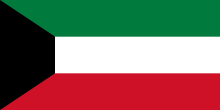Portal:Kuwait
The Kuwait Portal Kuwait, officially the State of Kuwait, is a country in West Asia. It is situated in the northern edge of Eastern Arabia at the tip of the Persian Gulf, bordering Iraq to the north and Saudi Arabia to the south. Kuwait also shares maritime borders with Iran. Kuwait has a coastal length of approximately 500 km (311 mi). Most of the country's population reside in the urban agglomeration of the capital and largest city Kuwait City. , Kuwait has a population of 4.82 million people of which 1.53 million are Kuwaiti citizens while the remaining 3.29 million are foreign nationals from over 100 countries. Historically, most of present-day Kuwait was part of ancient Mesopotamia. Before the discovery of oil, Kuwait was a regional trade port. Oil reserves were discovered in commercial quantities in 1938. In 1946, crude oil was exported for the first time. From 1946 to 1982, the country underwent large-scale modernization, largely based on income from oil production. In the 1980s, Kuwait experienced a period of geopolitical instability and an economic crisis following the stock market crash. In 1990, after oil production disputes with neighbouring Iraq, Kuwait was invaded, and later annexed into one of Iraq's governorates by Iraq under Saddam Hussein. The Iraqi occupation of Kuwait came to an end on February 26, 1991, after military intervention by a military coalition led by the United States and various other countries. Like some of the other Arab states in the Persian Gulf, Kuwait is an emirate. The emir is the head of state and the Al Sabah is the ruling family which dominates the country's political system. Kuwait's official state religion is Islam, specifically the Maliki school of Sunni Islam. Kuwait is a high-income economy, backed by the world's sixth largest oil reserves. Kuwaiti popular culture, in the form of theatre, radio, music, and television soap opera, is exported to neighboring GCC states. Kuwait is a founding member of the GCC and is also a member of the UN, AL, OPEC and the OIC. (Full article...) Selected article -The National Assembly (Arabic: مجلس الأمة) is the unicameral legislature of Kuwait. The National Assembly meets in Kuwait City. Because political parties are illegal in Kuwait, candidates run as independents. The National Assembly is made up of 50 elected members, then this 50 will be chosen from by the Emir and 16 direct appointed government ministers (ex officio members). The National Assembly is nominally elected but it operates in an authoritarian context where the Emir of Kuwait dominates politics and can dissolve the assembly. However, in contrast to parliaments in other Gulf kingdoms, the Kuwaiti assembly has considerably more formal and informal power than elsewhere in the region. (Full article...)Did you know...
Related portalsReligions in Kuwait MENA states TopicsWikiProjectsAssociated WikimediaThe following Wikimedia Foundation sister projects provide more on this subject:
Discover Wikipedia using portals |









































